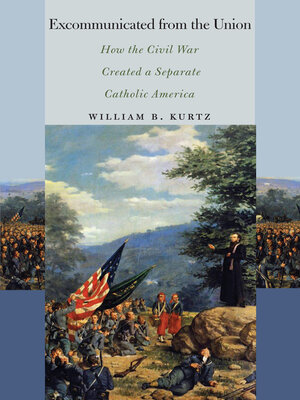Excommunicated from the Union
ebook ∣ How the Civil War Created a Separate Catholic America · The North's Civil War
By William B. Kurtz

Sign up to save your library
With an OverDrive account, you can save your favorite libraries for at-a-glance information about availability. Find out more about OverDrive accounts.
Find this title in Libby, the library reading app by OverDrive.



Search for a digital library with this title
Title found at these libraries:
| Library Name | Distance |
|---|---|
| Loading... |
“Concise, engaging . . . [A] superb study of the US Catholic community in the Civil War era.” —Civil War Book Review
Anti-Catholicism has had a long presence in American history. When the Civil War broke out in 1861, many Catholic Americans considered it a chance to prove their patriotism once and for all.
Exploring how Catholics sought to use their participation in the war to counteract religious and political nativism in the United States, Excommunicated from the Union reveals that while the war was an alienating experience for many of the 200,000 Catholics who served, they still strove to construct a positive memory of their experiences—in order to show that their religion was no barrier to their being loyal American citizens.
“[A] masterful interrogation of the fusion of faith, national crisis, and ethnic identity at a critical moment in American history. This is a notable and welcome contribution to Catholic, Civil War, and immigrant history.”? Journal of Southern History
Anti-Catholicism has had a long presence in American history. When the Civil War broke out in 1861, many Catholic Americans considered it a chance to prove their patriotism once and for all.
Exploring how Catholics sought to use their participation in the war to counteract religious and political nativism in the United States, Excommunicated from the Union reveals that while the war was an alienating experience for many of the 200,000 Catholics who served, they still strove to construct a positive memory of their experiences—in order to show that their religion was no barrier to their being loyal American citizens.
“[A] masterful interrogation of the fusion of faith, national crisis, and ethnic identity at a critical moment in American history. This is a notable and welcome contribution to Catholic, Civil War, and immigrant history.”? Journal of Southern History







